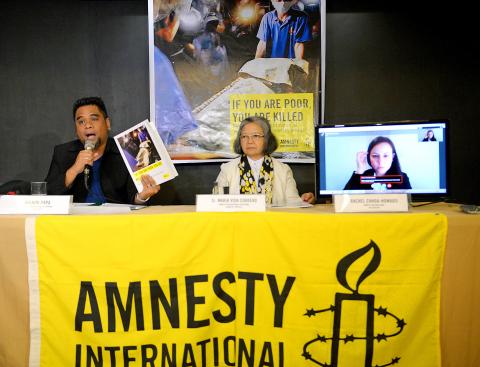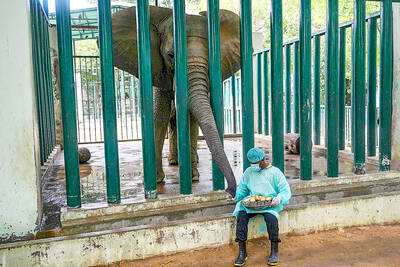Police prosecuting the war on drugs in the Philippines have behaved like the criminal underworld they are supposed to be suppressing, taking payments for killings and delivering bodies to funeral homes, according to a report released yesterday.
Amnesty International’s report said the wave of drugs-related killings since Philippine President Rodrigo Duterte came to power in the middle of last year appeared to be “systematic, planned and organized” by authorities and could constitute crimes against humanity.
Presidential spokesman Ernesto Abella defended the Philippine National Police (PNP) in response to the report, saying no extra-judicial killings were state-sponsored and investigations by Senate committees had proved that.

Photo: AFP
“There is no state-sponsored policy of extra-judicial deaths and that there is relentless effort on the part of the PNP to carry out the campaign properly and within legal processes,” he said.
In a series of reports last year, Reuters showed that the police had a 97 percent kill rate in their drug operations, the strongest proof yet that police were summarily shooting drug suspects.
The Reuters reports also found that low-level officials in poor neighborhoods helped police assemble “watch lists” of alleged drug users and pushers that were effectively hit lists, with many of the people named ending up dead.
Duterte used exaggerated and flawed data, including the number of drug users in the Philippines, to justify his anti-narcotics crackdown, according to a Reuters investigation.
The release of Amnesty’s investigation, which was based on 59 killings in 20 cities and towns, comes amid uncertainty over the crackdown after the government suspended all anti-drug operations by police on Monday due to rampant corruption.
The lead role in the campaign has now been given to the Philippine Drugs Enforcement Agency.
Duterte made the decision after a security meeting on Sunday triggered by the kidnap and killing of a South Korean businessman by drugs squad police. He said the incident, which took place at the national police headquarters, had embarrassed the country and tarnished the image of the police.
Amnesty said the vast majority of the killings it investigated “appear to have been extra-judicial killings — unlawful and deliberate killings carried out by government order or with its complicity or acquiescence.”
“The Duterte administration’s relentless pressure on the police to deliver results in anti-drug operations has helped encourage these abusive practices,” the report said.
A senior police officer told Amnesty that police are “paid by the encounter,” receiving the equivalent of at least US$160 per killing and received nothing for making arrests.
Amnesty said that some police are rewarded by undertakers for sending bodies their way, police steal from victims’ homes, and paid killers are on the police payroll.
“The police are behaving like the criminal underworld that they are supposed to be enforcing the law against, by carrying out extrajudicial executions disguised as unknown killers and ‘contracting out’ killings,” it said.
The government has denied sponsoring extra-judicial killings, or police collaboration with assassins.
Amnesty’s report included numerous references to the series of Reuters stories and investigations into the war on drugs in the Philippines.
In the series, Reuters found that officers often gave remarkably similar accounts of drug operations each time a suspect was shot dead.
Eyewitnesses also provided starkly different accounts of drug operations, with some saying suspects were shot dead as they pleaded for their lives.
Amnesty reported similar findings. Its report said that police accounts of shoot-outs and deaths during operations were “startlingly similar,” and often far different to witness testimony of victims being shot dead despite having shouted that they would surrender.
Amnesty’s investigation was carried out mainly in November and December last year and was based on interviews with 110 people.

NO EXCUSES: Marcos said his administration was acting on voters’ demands, but an academic said the move was emotionally motivated after a poor midterm showing Philippine President Ferdinand Marcos Jr yesterday sought the resignation of all his Cabinet secretaries, in a move seen as an attempt to reset the political agenda and assert his authority over the second half of his single six-year term. The order came after the president’s allies failed to win a majority of Senate seats contested in the 12 polls on Monday last week, leaving Marcos facing a divided political and legislative landscape that could thwart his attempts to have an ally succeed him in 2028. “He’s talking to the people, trying to salvage whatever political capital he has left. I think it’s

Polish presidential candidates offered different visions of Poland and its relations with Ukraine in a televised debate ahead of next week’s run-off, which remains on a knife-edge. During a head-to-head debate lasting two hours, centrist Warsaw Mayor Rafal Trzaskowski, from Polish Prime Minister Donald Tusk’s governing pro-European coalition, faced the Eurosceptic historian Karol Nawrocki, backed by the right-wing populist Law and Justice party (PiS). The two candidates, who qualified for the second round after coming in the top two places in the first vote on Sunday last week, clashed over Poland’s relations with Ukraine, EU policy and the track records of their

UNSCHEDULED VISIT: ‘It’s a very bulky new neighbor, but it will soon go away,’ said Johan Helberg of the 135m container ship that run aground near his house A man in Norway awoke early on Thursday to discover a huge container ship had run aground a stone’s throw from his fjord-side house — and he had slept through the commotion. For an as-yet unknown reason, the 135m NCL Salten sailed up onto shore just meters from Johan Helberg’s house in a fjord near Trondheim in central Norway. Helberg only discovered the unexpected visitor when a panicked neighbor who had rung his doorbell repeatedly to no avail gave up and called him on the phone. “The doorbell rang at a time of day when I don’t like to open,” Helberg told television

A team of doctors and vets in Pakistan has developed a novel treatment for a pair of elephants with tuberculosis (TB) that involves feeding them at least 400 pills a day. The jumbo effort at the Karachi Safari Park involves administering the tablets — the same as those used to treat TB in humans — hidden inside food ranging from apples and bananas, to Pakistani sweets. The amount of medication is adjusted to account for the weight of the 4,000kg elephants. However, it has taken Madhubala and Malika several weeks to settle into the treatment after spitting out the first few doses they